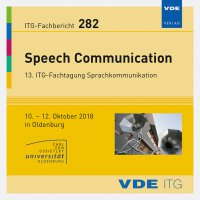Iterative Alternating Least-Squares Approach to Jointly Estimate the RETFs and the Diffuse PSD
Conference: Speech Communication - 13. ITG-Fachtagung Sprachkommunikation
10/10/2018 - 10/12/2018 at Oldenburg, Deutschland
Proceedings: Speech Communication
Pages: 5Language: englishTyp: PDF
Personal VDE Members are entitled to a 10% discount on this title
Authors:
Tammen, Marvin; Doclo, Simon (Department of Medical Physics and Acoustics & Cluster of Excellence Hearing4All, University of Oldenburg, Germany)
Kodrasi, Ina (Idiap Research Institute, Speech and Audio Processing Group, Martigny, Switzerland)
Abstract:
The multi-channel Wiener filter (MWF) is a commonly used speech enhancement technique for improving speech quality and intelligibility in reverberant and noisy environments. The MWF is typically implemented as a minimum variance distortionless response (MVDR) beamformer followed by a single-channel Wiener postfilter. Assuming that reverberation and ambient noise can be modeled as diffuse sound fields, estimates of the relative early transfer function (RETF) vector of the target speaker and of the diffuse power spectral density (PSD) are required to implement the MWF. RETF vector and diffuse PSD estimation methods are often decoupled, i.e., one of the quantities is estimated assuming that the other quantity is known. In this paper, we aim at jointly estimating the RETF vector and the diffuse PSD by minimizing the Frobenius norm of an error matrix based on the presumed signal model. To solve this minimization problem, we propose to use an alternating least-squares approach. Simulation results using artificial and real data show that the proposed method leads to a better performance than a state-of-the-art method based on covariance whitening.


